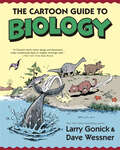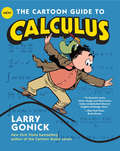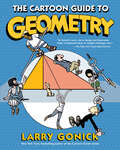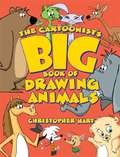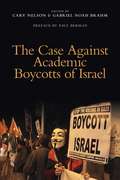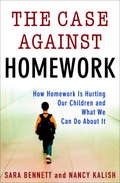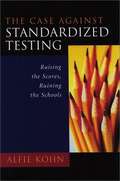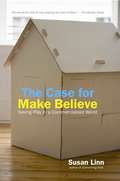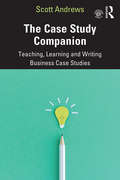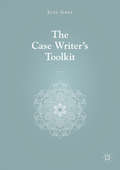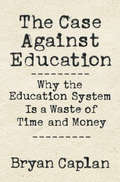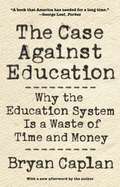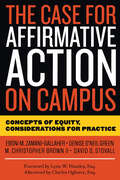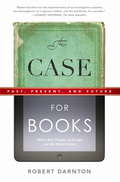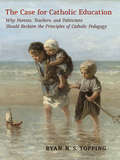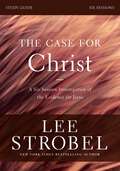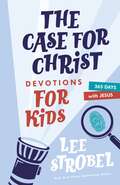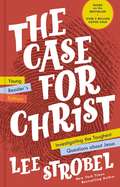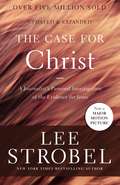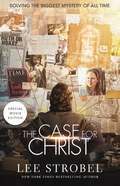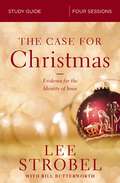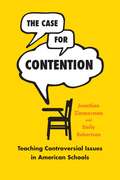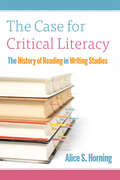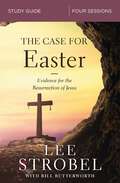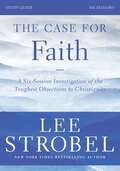- Table View
- List View
The Cartoon Guide to Biology
by Larry Gonick David WessnerFrom New York Times bestselling author Larry Gonick and Davidson College biology professor David Wessner comes this comprehensive and humorous cartoon guide to topics in biologyDid you faint when your middle school science teacher asked you to dissect a frog? Do you think DNA stands for “Don’t Know the Answer”? Do you still cling to the belief that osmosis was the name of Ozzy Osbourne’s last tour? If you said yes to any of these questions—or even if you didn’t—then you need The Cartoon Guide to Biology. The latest from New York Times bestselling author Larry Gonick—writing with Davidson College biology professor David Wessner—is a hilarious and informative handbook to the science of life. From the inner workings of the cell, to the magic of gene expression, to the Krebs and Calvin cycles, to sexual and asexual reproduction, The Cartoon Guide to Biology uses simple, clear, humorous illustrations to make biology’s most complex concepts understandable and entertaining. Whether you’re peering into the microscope for the first time or brushing up after decades of de-evolution, this book has you covered.
The Cartoon Guide to Calculus (Cartoon Guide Series)
by Larry GonickA complete—and completely enjoyable—new illustrated guide to calculusMaster cartoonist Larry Gonick has already given readers the history of the world in cartoon form. Now, Gonick, a Harvard-trained mathematician, offers a comprehensive and up-to-date illustrated course in first-year calculus that demystifies the world of functions, limits, derivatives, and integrals. Using clear and helpful graphics—and delightful humor to lighten what is frequently a tough subject—he teaches all of the essentials, with numerous examples and problem sets. For the curious and confused alike, The Cartoon Guide to Calculus is the perfect combination of entertainment and education—a valuable supplement for any student, teacher, parent, or professional.
The Cartoon Guide to Geometry
by Larry GonickA comprehensive new illustrated guide to geometry—from New York Times bestselling cartoonist Larry GonickWhat's the point of points? Where do we draw the line? If there are two sides to everything, then what's up with triangles, squares, and polygons?Once again, mathematician-turned-cartoonist Larry Gonick uses his unique gift for witty, lively, and clear exposition to demystify another complex subject: geometry.Moving from the most basic geometrical concepts—planes, lines, and points—through elementary postulates and to elaborate proofs, The Cartoon Guide to Geometry is a comprehensive primer on all the essentials of plane geometry: angles, triangles, area, similarity, and, yes, the Pythagorean theorem. Carefully tailored to the curriculum standards and standardized testing guidelines of the subject, the book provides innovative visuals that develop proofs and constructions with sequential graphics rather than single illustrations. The reader emerges with a deep grasp of key ideas—and has fun getting there.
The Cartoonist's Big Book of Drawing Animals (Christopher Hart's Cartooning)
by Christopher HartAll of Chris Hart's how-to-draw titles are best-sellers. And the best-sellers among all of his best-sellers are the ones about animals. How to Draw Cartoon Animals, just one example, appears regularly on the BookScan Top 50 Art Books list, with more than 190,000 copies sold. Now The Cartoonist's Big Book of Drawing Animals is ready to roar onto the market! All the most popular animals are here, including dogs, cats, horses, penguins, lions, tigers, bears, and elephants, as well as the favorite sidekick animals--pigs, kangaroos, giraffes, turtles. Simple step-by-step drawings show how to capture every cartoon emotion, from cutesy-sweet to begging to scheming, and how to create every box-office type, from baby animals to villain animals to clueless animals and much more. Faces, bodies, paws, feet, wings, tails--every part of dozens of animals is explained in this bumper book by the world's leading author of instructional art books. It's a mega-menagerie for cartoonists!From the Trade Paperback edition.
The Case Against Academic Boycotts of Israel
by Cary Nelson Gabriel Noah BrahmHow should we understand the international debate about the future of Israel and the Palestinians? Can justice be achieved in the Middle East? Until now, there was no single place for people to go to find detailed scholarly essays analyzing proposals to boycott Israel and the Boycott, Divestment, and Sanctions (BDS) movement of which they are a part. This book for the first time provides the historical background necessary for informed evaluation of one of the most controversial issues of our day-- the struggle between two peoples living side-by-side but with conflicting views of history and conflicting national ambitions. This book encourages empathy for all parties, but it also takes a cold look at what solutions are realistic and possible. In doing so, it tackles issues, like the role of anti-Semitism in calls for the abolition of the Jewish state, that many have found impossible to confront until now. The book gathers essays by an international cohort of scholars from Britain, Israel, and the United States.
The Case Against Homework: How Homework Is Hurting Our Children and What We Can Do About It
by Sara Bennett Nancy KalishDoes assigning fifty math problems accomplish any more than assigning five? Is memorizing word lists the best way to increase vocabulary--especially when it takes away from reading time? And what is the real purpose behind those devilish dioramas? The time our children spend doing homework has skyrocketed in recent years. Parents spend countless hours cajoling their kids to complete such assignments--often without considering whether or not they serve any worthwhile purpose. Even many teachers are in the dark: Only one of the hundreds the authors interviewed and surveyed had ever taken a course specifically on homework during training. The truth, according to Sara Bennett and Nancy Kalish, is that there is almost no evidence that homework helps elementary school students achieve academic success and little evidence that it helps older students. Yet the nightly burden is taking a serious toll on America's families. It robs children of the sleep, play, and exercise time they need for proper physical, emotional, and neurological development. And it is a hidden cause of the childhood obesity epidemic, creating a nation of "homework potatoes. " InThe Case Against Homework, Bennett and Kalish draw on academic research, interviews with educators, parents, and kids, and their own experience as parents and successful homework reformers to offer detailed advice to frustrated parents. You'll find out which assignments advance learning and which are time-wasters, how to set priorities when your child comes home with an overstuffed backpack, how to talk and write to teachers and school administrators in persuasive, nonconfrontational ways, and how to rally other parents to help restore balance in your children's lives. Empowering, practical, and rigorously researched,The Case Against Homeworkshows how too much work is having a negative effect on our children's achievement and development and gives us the tools and tactics we need to advocate for change. Also available as an eBook From the Hardcover edition.
The Case Against Standardized Testing: Raising the Scores, Ruining the Schools
by Alfie KohnKohn's central message is that standardized tests are not a force of nature but a force of politics and political decisions can be questioned, challenged, and ultimately reversed.
The Case For Make Believe
by Susan LinnIn The Case for Make Believe, Harvard child psychologist Susan Linn tells the alarming story of childhood under siege in a commercialized and technology-saturated world. Although play is essential to human development and children are born with an innate capacity for make believe, Linn argues that, in modern-day America, nurturing creative play is not only countercultural-it threatens corporate profits.A book with immediate relevance for parents and educators alike, The Case for Make Believe helps readers understand how crucial child's play is-and what parents and educators can do to protect it. At the heart of the book are stories of children at home, in school, and at a therapist's office playing about real-life issues from entering kindergarten to a sibling's death, expressing feelings they can't express directly, and making meaning of an often confusing world.In an era when toys come from television and media companies sell videos as brain-builders for babies, Linn lays out the inextricable links between play, creativity, and health, showing us how and why to preserve the space for make believe that children need to lead fulfilling and meaningful lives.
The Case Study Companion: Teaching, Learning and Writing Business Case Studies
by Scott AndrewsThe Case Study method of teaching and learning, adopted by business schools and management centres globally, provides an important function in management education, but employing it effectively can often be a challenge. This book provides practical insights, tools and approaches for both case teaching and writing, drawing on perspectives from expert practitioners around the world. This book aims to critically examine different approaches to using case studies in group-based, participant-centred learning environments, exploring good practices for case teaching and learning. It provides guidance for case writers on various approaches to structuring case data, presentational formats, and the use of technology in the construction of different types of cases. It also demonstrates the use of the case method as a tool for assessment, supporting students’ own development of cases to showcase good practice in organisations. The final section of this book showcases some of the resources available, providing links and reviews of additional material that can support future case teaching and writing practice, including publication. The Case Study Companion is designed for lecturers using cases within their teaching across all management disciplines, as well as those training for Professional Development and Management Education qualifications. It will also be useful for postgraduate, MBA and Executive Education students wanting to make the most of case studies in their learning and assessments.
The Case Writer’s Toolkit
by June GweeThis book deconstructs the case study, describes the case writing process and explains how a good case study is composed. It is a reference book that accompanies case writers on their case writing journey. It serves as a guide for writers to develop case studies for teaching, research, and knowledge-capture. There are illustrations and charts to help writers visualise concepts, signpost ideas, break down complex information and apply techniques in a practical manner.
The Case against Education: Why the Education System Is a Waste of Time and Money
by Bryan CaplanWhy we need to stop wasting public funds on educationDespite being immensely popular--and immensely lucrative—education is grossly overrated. In this explosive book, Bryan Caplan argues that the primary function of education is not to enhance students' skill but to certify their intelligence, work ethic, and conformity—in other words, to signal the qualities of a good employee. Learn why students hunt for easy As and casually forget most of what they learn after the final exam, why decades of growing access to education have not resulted in better jobs for the average worker but instead in runaway credential inflation, how employers reward workers for costly schooling they rarely if ever use, and why cutting education spending is the best remedy.Caplan draws on the latest social science to show how the labor market values grades over knowledge, and why the more education your rivals have, the more you need to impress employers. He explains why graduation is our society's top conformity signal, and why even the most useless degrees can certify employability. He advocates two major policy responses. The first is educational austerity. Government needs to sharply cut education funding to curb this wasteful rat race. The second is more vocational education, because practical skills are more socially valuable than teaching students how to outshine their peers.Romantic notions about education being "good for the soul" must yield to careful research and common sense—The Case against Education points the way.
The Case against Education: Why the Education System Is a Waste of Time and Money
by Bryan CaplanWhy we need to stop wasting public funds on educationDespite being immensely popular—and immensely lucrative—education is grossly overrated. Now with a new afterword by Bryan Caplan, this explosive book argues that the primary function of education is not to enhance students' skills but to signal the qualities of a good employee. Learn why students hunt for easy As only to forget most of what they learn after the final exam, why decades of growing access to education have not resulted in better jobs for average workers, how employers reward workers for costly schooling they rarely ever use, and why cutting education spending is the best remedy. Romantic notions about education being "good for the soul" must yield to careful research and common sense—The Case against Education points the way.
The Case for Affirmative Action on Campus: Concepts of Equity, Considerations for Practice
by Eboni M. Zamani-Gallaher M. Christopher Brown II Denise O’Neil Green David O. Stovall* Marshalls the arguments for affirmative action* Offers strategies for actionWhy is affirmative action under attack? What were the policy’s original purposes, and have they been achieved? What are the arguments being arrayed against it? And–for all stakeholders concerned about equity and diversity on campus–what’s the way forward, politically, legally, and practically?The authors explore the historical context, the philosophical and legal foundations of affirmative action, present contemporary attitudes to the issue on and off campus, and uncover the tactics and arguments of its opponents. They conclude by offering strategies to counter the erosion of affirmative action, change the basis of the discourse, and coordinate institutional support to foster inclusive college environments and multi-ethnic campus communities.This book analyzes the ideological and legal construction of colorblind legislation that has led to the de facto exclusion of people of color from institutions of higher education. It addresses the role of the courts in affecting affirmative action in higher education as a workplace and place of study. It documents the under-representation of collegians of color and presents research on student opinion on race-based policies at two- and four-year institutions. It details the pervasiveness of the affirmative action debate across educational sectors and the status of race among myriad factors considered in college admissions. Finally, it considers affirmative action as a pipeline issue and in the light of educational policy.
The Case for Books: Past, Present, and Future
by Robert DarntonThe era of the printed book is at a crossroad. E-readers are flooding the market, books are available to read on cell phones, and companies such as Google, Amazon, and Apple are competing to command near monopolistic positions as sellers and dispensers of digital information. Already, more books have been scanned and digitized than were housed in the great library in Alexandria. Is the printed book resilient enough to survive the digital revolution, or will it become obsolete? In this lasting collection of essays, Robert Darnton?an intellectual pioneer in the field of this history of the book?lends unique authority to the life, role, and legacy of the book in society.
The Case for Catholic Education: Why Parents, Teachers, and Politicians Should Reclaim the Principles of Catholic Pedagogy
by Ryan N. S. ToppingCatholic schools have long contributed to the mission of the Church and to the flourishing of society. During the past few decades, however, Catholic schools have suffered severe losses, both in their religious identity and in their capacity to attract students. With penetrating insights, pointed anecdotes, and drawing upon recent empirical studies and Church documents, Ryan Topping describes the near collapse of Catholic education in North America and uncovers the enduring principles of authentic renewal. In The Case for Catholic Education you'll discover: · the three purposes of Catholic education · why virtue is more important than self-esteem · the elements of a true "common core" curriculum · essential differences between "progressive" and "Catholic" models of learning · helpful study questions and a research guide "This is an accessible and eminently readable book on a topic which no Catholic can afford to ignore."--Joseph Pearce, Aquinas College, Nashville, TN "The Case for Catholic Education speaks to the heart of the debate over whether Catholic education is 'worth it.'"--Sister John Mary Fleming, O.P., Executive Director for Catholic Education, USCCB "The Case for Catholic Education will surely play a vital role in reinvigorating the handing-on of essential Catholic truths."--Sister Joseph Andrew Bogdanowicz, O.P., Dominican Sisters of Mary, Mother of the Eucharist, Ann Arbor, MI "This short book contains an astonishing wealth of insights and practical suggestions."--Dr. Keith Cassidy, President of Our Lady Seat of Wisdom Academy "Ryan Topping has written an engaging and coherent analysis of the state of Catholic education in North America, which will be useful for teachers in Britain, too."--Dr. Paul Shrimpton, Magdalen College School, Oxford "An insightful view of our threatened patrimony and a framed vision for what educating and forming our children may still yet become."--Dr. Jason Fugikawa, Dean of Academics and Faculty, Holy Family Academy, Manchester, NH
The Case for Christ Bible Study Guide Revised Edition: Investigating the Evidence for Jesus
by Lee Strobel Garry D. PooleIs there credible evidence that Jesus--the carpenter from the ancient town of Nazareth--really is the Son of God?In this video Bible study (DVD/digital video sold separately), based on the New York Times bestselling book The Case for Christ, participants journey with Lee Strobel on a quest for the truth about Jesus.Skeptics dismiss the Jesus of the Gospels by claiming there is no evidence that he was God's Son. But does their claim hold weight? And, if not, what evidence is there, especially outside the Bible? Lee Strobel--a former legal journalist and one-time atheist--presents the findings of his own search for truth.This study guide is ideal for:Believers who want to learn more about the hard evidence behind their faith.Christians who find themselves becoming uncertain or doubtful.Anyone investigating, curious, or even skeptical about Christianity.Sift through historical evidence and passages from a range of theologians, thinkers, philosophers, and laypeople on the topic of Jesus as you weigh compelling expert testimony that rejects easy answers.With discussion prompts, Bible passages, and personal reflection cues facilitated by contributor Garry Poole, Strobel invites you and your group to investigate the truth about Jesus Christ as he leads up to the facts that guided him from atheism to faith in Christ.By the end of this six-session study, groups may very well see Jesus in a new way--and even, like Strobel, find their life transformed.Sessions include:The Investigation of a LifetimeEyewitness EvidenceEvidence Outside the BibleAnalyzing JesusEvidence for the ResurrectionReaching Your VerdictDesigned for use with The Case for Christ Video Study 9780310698517 (sold separately).
The Case for Christ Devotions for Kids: 365 Days with Jesus (Case for… Series for Kids)
by Lee StrobelThe tough questions kids 8-12 ask about faith, Jesus, and Christianity are investigated and answered in this 365-day devotional that uses the historical facts and theological truths found in The Case for Christ to help young readers develop their faith and understand what it means to be a Christian. Each day&’s reading also includes reflection questions, helping kids think through what their faith personally means to them.Become an expert witness for Jesus! For kids who want to learn more about Christianity or simply have questions about the Bible, this devotional helps young readers understand why Jesus&’s ministry and miracles are true and why we can confidently believe in Jesus today.The Case for Christ Devotions for Kids:Includes 365 days of devotions for kids that use kid-friendly language, engaging illustrations, and clear examples to help kids understand faith and the proven truths that support ChristianityMixes inspirational prose with facts, research, and true storiesIs based around material from the New York Times bestselling The Case for Christ by Lee StrobelIn addition, The Case for Christ Devotions for Kids:Can be used for family devotion timeIs ideal for boys and girls ages 8-12Is a perfect way to encourage a child&’s spiritual development and engage them with the BibleMakes a great gift for Christmas, Easter, or at the start of a new yearIf you enjoyed The Case for Christ Devotions for Kids, don&’t forget to check out The Case for Christ for Young Readers, which directly adapts Lee Strobel&’s The Case for Christ for kids 8-12.
The Case for Christ Young Reader's Edition: Investigating the Toughest Questions about Jesus
by Lee StrobelIs Jesus real? Was he actually born in a stable? Did he really come back from the dead? Aren&’t all the stories in the Bible about Jesus just that ... stories? Join in this incredible search for the truth about Jesus, including the answers that rocked the world of investigative reporter and international bestselling author Lee Strobel.Here&’s a book that finally answers the most important questions about the existence, life, death, and resurrection of Jesus. The Case for Christ Young Reader&’s Edition, based on the adult edition, with over 5 million copies sold, is packed full of well-researched, reliable, and eye-opening investigations. In these pages, Lee Strobel—an award-winning legal journalist—tackles the toughest questions head-on. He investigates the historical reliability, eye witness testimonies, and scientific evidence of Jesus&’s birth, miracles, ministry, and resurrection.Will Lee&’s findings bring Christianity&’s claims about Jesus tumbling down like a house of cards?Like Strobel, you will be amazed at the evidence—how much there is, how strong it is, and what it says. The facts are in. What will your verdict be in The Case for Christ?The Case for Christ Young Reader&’s Edition:Is packed full of well-researched, reliable, and eye-opening investigations of some of the toughest questions you have about the existence, miracles, ministry, and resurrection of Jesus of NazarethIs logical and easy to understandIncludes the evidence about Jesus that rocked the world of atheist investigative reporter Lee StrobelIs a sturdy hardcover edition with two-tone interior and ribbon marker
The Case for Christ: A Journalist's Personal Investigation of the Evidence for Jesus (Case for ... Series)
by Lee StrobelIs there credible evidence that Jesus of Nazareth really is the Son of God? Retracing his own spiritual journey from atheism to faith, Lee Strobel, former legal editor of the Chicago Tribune, cross-examines a dozen experts with doctorates from schools like Cambridge, Princeton, and Brandeis who are recognized authorities in their own fields.Strobel challenges them with questions like, How reliable is the New Testament? Does evidence for Jesus exist outside the Bible? Is there any reason to believe the resurrection was an actual event?Winner of the Gold Medallion Book Award and twice nominated for the Christian Book of the Year Award, Strobel’s tough, point-blank questions read like a captivating, fast-paced novel. But it’s not fiction. It’s a riveting quest for the truth about history’s most compelling figure.The new edition includes scores of revisions and additions, including updated material on archaeological and manuscript discoveries, fresh recommendations for further study, and an interview with the author that tells dramatic stories about the book's impact, provides behind-the-scenes information, and responds to critiques of the book by skeptics. As The Case for Christ and its ancillary resources approach 10 million copies in print, this updated edition will prove even more valuable to contemporary readers.
The Case for Christ: Solving the Biggest Mystery of All Time (Case for ... Series)
by Lee StrobelIs there credible evidence that Jesus of Nazareth really is the Son of God?Now a major motion picture, Case for Christ, Strobel retraces his own spiritual journey from atheism and former legal editor of the Chicago Tribune to faith. Strobel cross-examines a dozen experts with doctorates from schools like Cambridge, Princeton, and Brandeis who are recognized authorities in their own fields. He challenges them with questions like, how reliable is the New Testament? Does evidence for Jesus exist outside the Bible? Is there any reason to believe the resurrection was an actual event?Strobel’s tough, point-blank questions read like a captivating, fast-paced novel. But it’s not fiction. It’s a riveting quest for the truth about history’s most compelling figure.The new edition includes scores of revisions and additions, including updated material on archaeological and manuscript discoveries, fresh recommendations for further study, and an interview with the author that tells dramatic stories about the book's impact, provides behind-the-scenes information, and responds to critiques of the book by skeptics. As The Case for Christ and its ancillary resources approach 10 million copies in print, this updated edition will prove even more valuable to contemporary readers.
The Case for Christmas Bible Study Guide: Evidence for the Identity of Jesus
by Lee StrobelIn this video Bible study (DVD/digital video sold separately)--led by the New York Times bestselling author Lee Strobel--you and your group will dig into the true Christmas story to sort out the fact from the fiction and the hype from the holiness. The Case for Christmas study helps you reflect on the gospel story of the birth of Jesus in a focused, group-oriented way that might change the way you view the season.During his faith journey, Lee Strobel investigated the real meaning behind all those nativity scenes he saw outside of churches. In this four-week study, Lee reveals what he discovered from consulting experts on the Bible, archaeology, and messianic prophecy as he sought to separate the truth from the tradition.In each session you and your group explore:What the Bible actually says about Jesus' birth and how you can know it's accurate.Whether the Christmas story actually happened or developed from the myths of the day.The Bible's claim that Jesus was born of a virgin and why it's important to your faith.How Jesus--and only Jesus--fulfilled hundreds of Old Testament biblical prophecies about the Messiah.Regardless of whether the center of your Christmas decorations is the nativity set on your mantle or the presents under the tree, The Case for Christmas study invites you to look beyond the familiar traditions of the season, challenge you to examine the evidence for yourself, and consider why Christmas really matters and why it's still so relevant today.Sessions include:Setting the Record StraightBeneath the Fake NewsA Mind-Boggling PropositionThe Prophetic FingerprintDesigned for use with The Case for Christmas Video Study/The Case for Easter Video Study (sold separately).
The Case for Contention: Teaching Controversial Issues in American Schools
by Emily Robertson Jonathan ZimmermanFrom the fights about the teaching of evolution to the details of sex education, it may seem like American schools are hotbeds of controversy. But as Jonathan Zimmerman and Emily Robertson show in this insightful book, it is precisely because such topics are so inflammatory outside school walls that they are so commonly avoided within them. And this, they argue, is a tremendous disservice to our students. Armed with a detailed history of the development of American educational policy and norms and a clear philosophical analysis of the value of contention in public discourse, they show that one of the best things American schools should do is face controversial topics dead on, right in their classrooms. Zimmerman and Robertson highlight an aspect of American politics that we know all too well: We are terrible at having informed, reasonable debates. We opt instead to hurl insults and accusations at one another or, worse, sit in silence and privately ridicule the other side. Wouldn’t an educational system that focuses on how to have such debates in civil and mutually respectful ways improve our public culture and help us overcome the political impasses that plague us today? To realize such a system, the authors argue that we need to not only better prepare our educators for the teaching of hot-button issues, but also provide them the professional autonomy and legal protection to do so. And we need to know exactly what constitutes a controversy, which is itself a controversial issue. The existence of climate change, for instance, should not be subject to discussion in schools: scientists overwhelmingly agree that it exists. How we prioritize it against other needs, such as economic growth, however—that is worth a debate. With clarity and common-sense wisdom, Zimmerman and Robertson show that our squeamishness over controversy in the classroom has left our students woefully underserved as future citizens. But they also show that we can fix it: if we all just agree to disagree, in an atmosphere of mutual respect.
The Case for Critical Literacy: A History of Reading in Writing Studies
by Alice S. HorningThe Case for Critical Literacy explores the history of reading within writing studies and lays the foundation for understanding the impact of this critical, yet often untaught, skill. Every measure of students’ reading comprehension, whether digital or analog, demonstrates that between 50 and 80 percent of students are unable to capture the substance of a full discussion or evaluate material for authority, accuracy, currency, relevancy, appropriateness, and bias. This book examines how college-level instruction reached this point and provides pedagogical strategies that writing instructors and teachers can use to address the problem. Alice Horning makes the case for the importance of critical reading in the teaching of writing with intentionality and imagination, while sharing glimpses of her own personal history with reading and writing. Horning provides the context for understanding what college faculty face in their classrooms and offers a history of critical literacy that explains why, to date, it has mostly neglected or ignored the diverse statuses of students’ reading challenges. The Case for Critical Literacy explores actionable options to better meet students’ literacy needs. College and university faculty, especially writing instructors, will benefit from an understanding of what has happened in the field and what needs to change.
The Case for Easter Bible Study Guide: Investigating the Evidence for the Resurrection
by Lee StrobelWhat do the Gospel accounts actually say about Jesus' death and resurrection? How can we know the biblical accounts are accurate?In his bestselling book The Case for Christ, Lee Strobel retraced his spiritual journey from atheism to faith by showing how the evidence he obtained from experts in the field of history, archaeology, and ancient manuscripts led him to the verdict that Jesus truly was the Son of God.In this four-week Easter study (DVD/digital downloads sold separately), Lee investigates the story surrounding the resurrection of Jesus—and how we can know that it is true.In each session, you'll explore:How to understand the differences between the Gospel accounts.How to use historical and medical evidence to build a strong case for Jesus' resurrection.Why the Gospel writers are credible when they make this claim.Who witnessed Jesus alive after the crucifixion and how it's clear that the early church carried on this teaching. The Case for Easter invites you and your group to examine the evidence for yourselves and point you to the conclusion that Jesus was the Son of God who conquered the grave.___________________Designed for use with The Case for Christmas Video Study/The Case for Easter Video Study (sold separately). This DVD is a set of two videos to accompany The Case for Christmas Study Guide and The Case for Easter Study Guide (each guide sold separately).
The Case for Faith Study Guide Revised Edition: Investigating the Toughest Objections to Christianity
by Lee Strobel Garry D. PooleDoubt is familiar territory for Lee Strobel, the former atheist and award-winning author of books for skeptics and Christians. But he believes that faith and reason go hand in hand, and that Christianity is a defensible religion. In this six-session video curriculum, Strobel uses his journalistic approach to explore the most common emotional obstacles to faith in Christ. These include the natural inclination to wrestle with faith and doubt, the troubling presence of evil and suffering in the world, and the exclusivity of the Christian gospel. They also include this compelling question: Can I doubt and be a Christian? Through compelling video of personal stories and experts addressing these topics, combined with reflection and interaction, Christians and spiritual seekers will learn how to overcome these obstacles, deepen their spiritual convictions, and find new confidence that Christianity is a reasonable faith.
